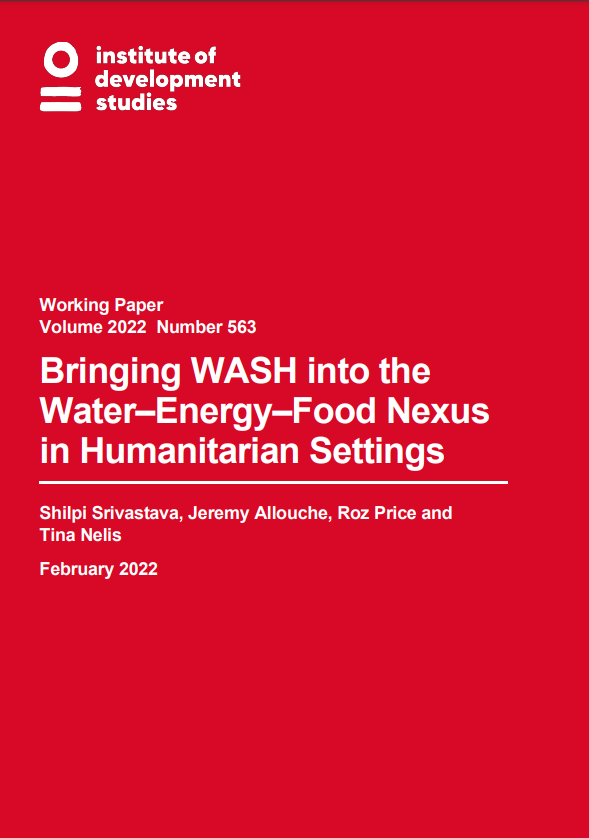Bringing WASH into the Water-Energy-Food Nexus in Humanitarian Settings
 |
Intégrer l'EAH au nexus eau-énergie-alimentation dans les situations de crise humanitaire
publication Feb 2022 ; 34 pages
Aut. Tina Nelis
Ed. IDS - Brighton
Téléchargeable sous format: PdF
Téléchargeable chez l'éditeur
Résumé:
Ce document examine le nexus eau-énergie-alimentation dans un contexte humanitaire, avec un accent particulier sur l'eau, l'assainissement et l'hygiène. En s'appuyant sur le cas des camps de réfugiés Rohingya au Bangladesh, nous examinons comment l'accès à l'eau, à l'assainissement et à l'hygiène au niveau des ménages est façonné par l'utilisation, l'accès et la disponibilité de l'énergie et de la nourriture, et enfin leurs effets sur les interactions entre les hôtes et les réfugiés. Nous constatons qu'il existe des liens implicites et explicites entre EAH et le nexus. De plus, toute intervention dans l'un des domaines du nexus a des effets d'entraînement positifs sur les autres ressources, notamment en améliorant l'accès et l'utilisation des ressources. Abstract:
This paper examines the water–energy–food (WEF) nexus in a humanitarian context, with a specific focus on water, sanitation and hygiene (WASH). Drawing on the case of the Rohingya refugee camps in Bangladesh, we examine how household-level access to WASH shapes and is shaped by use, access, and availability of energy and food, and finally their effects on host–refugee interactions. We find that there are implicit and explicit links between WASH and WEF. Moreover, any small intervention in any of the WEF areas has positive knock-on effects on the other resources, especially in enhancing resource access and use.
Mots clefs: |
humanitaire, urgentiste (CI) (DT) (OP) (ope) , nexus eau-énergie (CI) (DT) (OP) (ope) , sécurité alimentaire (CI) (DT) (OP) (ope) |
Pays concerné: |
Editeur/Diffuseur: |
|
IDS
-
Institute of Development Studies - Brighton - Royaume Uni |
En cas de lien brisé, nous le mentionner à communication@pseau.org